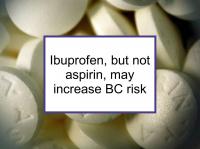A new study has reported that while aspirin use is associated with reduced risk of breast cancer, ibuprofen use may increase it. The study was designed to investigate the association between non-steroidal anti-inflammatory drug (NSAID) use and risk of breast cancer. NSAIDs reduce inflammation, pain and fever.
Over-the-counter NSAIDs include aspirin, ibuprofen (Advil, Motrin), and naproxen (Aleve). Use of NSAIDs has been reported to be associated with reduced risk of breast cancer, however the findings have been inconsistent. The authors theorized that this inconsistency may be a result of differences in the origin and development of breast tumors of different subtypes.
The study included 1,170 women with primary breast cancer in Western New York, as well as 2,115 randomly selected cancer-free controls. Study participants were interviewed regarding their aspirin and ibuprofen use during the year prior to study enrollment, as well as use throughout their adult lives.
Both recent and lifetime use of aspirin was found to be associated with reduced risk of breast cancer, with no differences by subtype. On the other hand, recent users of ibuprofen had approximately one-third higher risk of breast cancer than non-users.
The tumors in users of ibuprofen tended to be estrogen receptor positive (ER+) (including both ER+/PR+ and ER+/PR-) and non-HER2 overexpressing (HER2-).
However, ibuprofen use also increased the risk of luminal B (estrogen receptor and/or progesterone receptor positive, HER2+) tumors. In fact, only the risk of triple negative breast cancer (ER-/PR-/HER2-) did not appear to be increased by recent ibuprofen use.
The authors conclude that the study findings support the hypothesis of varied causes or origins of breast cancer subtypes and that aspirin and ibuprofen have different effects.
